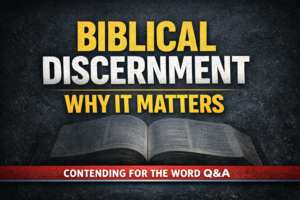⏱️ Estimated Reading Time: 4 min read
 How can a book written by many different authors over 2000 years ago have anything relevant for us today? Why I should I believe the claims of this book, namely the claim it is the word of God. Who is this God and why should I care? Why should I take this book seriously and obey what it says? These and many other questions often vex individuals who struggle with the reality that Scripture is the Word of God that is alive and powerful for us today just as it was when it was written. Many people also push back on the idea that God has revealed Himself in a consistent and powerful way through a written document. Author Barry Cooper, in his book Can I Really Trust the Bible? tackles these questions affirming along the way the trustworthiness, veracity, and applicability of God’s word rooting his discussion in the need to put the words found in Scripture into action in our life.
How can a book written by many different authors over 2000 years ago have anything relevant for us today? Why I should I believe the claims of this book, namely the claim it is the word of God. Who is this God and why should I care? Why should I take this book seriously and obey what it says? These and many other questions often vex individuals who struggle with the reality that Scripture is the Word of God that is alive and powerful for us today just as it was when it was written. Many people also push back on the idea that God has revealed Himself in a consistent and powerful way through a written document. Author Barry Cooper, in his book Can I Really Trust the Bible? tackles these questions affirming along the way the trustworthiness, veracity, and applicability of God’s word rooting his discussion in the need to put the words found in Scripture into action in our life.
There are many books on the market today that address the Word of God. Some are quite scholarly, looking at every historical, linguistic, and theological point of evidence while others provide a simpler approach, simply stating the Bible is to be trust well because God wrote it. Since most will likely not grab the lengthier tomes on the Bible and many desire something more than mere simplicity when it comes to this subject matter, a book such as Cooper’s is a welcome addition to the conversation.
This is a book that covers the needed scholarly issues concerning Scripture such as the number of authors who were inspired by God to write down what God desired humanity to know, the number of available Greek manuscripts that affirm we can truly know with great certainty what the original autographs (first version) stated, as well as the internal evidence in Scripture that declares it to be God-breathed, from the very mouth of God. All those issues are definitely needed in a book on this subject matter and Cooper does a brilliant job of noting the relevant facts and why they matter and he does so in a very accessible manner. Those facts are ones the believer can grab hold of and share with the skeptic who tends to deny or question the validity of Scripture as being from God.
Where I think this book shines brightest is where Cooper’s discussion ultimately leads, namely moving forward from merely accepting Scripture to be true to a place where those truths lead the individual to actually “tasting the honey” of God’s word. Cooper aptly notes, “When you see the sun, you know it’s bright. When you taste honey, you know it’s sweet. When you see Jesus Christ in Scripture, you know he is Lord. And when you put God’s word into practice, you know it’s for real.” This excellent comment drives home the difference between knowing God and His word and KNOWING God and His word. One is mere head knowledge, the acceptance of the Bible as being the source of truth and perhaps even noting it is from the very mouth of God. The proper approach and what God wants from us is to know Him through the pages of Scripture, to let the word of God come alive in your life through the Holy Spirit. Such an approach moves the word from head to heart. It is this concept which Cooper drives home repeatedly. Taste and see that the word of God is true.
I highly recommend this book for believers and skeptics alike. It’s simple yet powerful message that God’s word can be trusted and applied to every area of life is rooted in the timeless truth of Scripture. This would be an excellent book to share with those who are waffling on the issue of whether the Word of God can be trusted. Cooper’s arguments are salient, easy to understand, and most importantly rooted in sound doctrine. For those who want to know why we can taste and see that God’s Word is nourishment to our very being, this is the book to read. It will excite you to dig deep and wide into God’s holy word.
This book is available for purchase from The Good Book Company by clicking here.
I received this book for free from The Good Book Company via Cross Focused Reviews for this review. I was not required to write a positive review. The opinions I have expressed are my own. I am disclosing this in accordance with the Federal Trade Commission’s 16 CFR, Part 255 : “Guides Concerning the Use of Endorsements and Testimonials in Advertising.”




